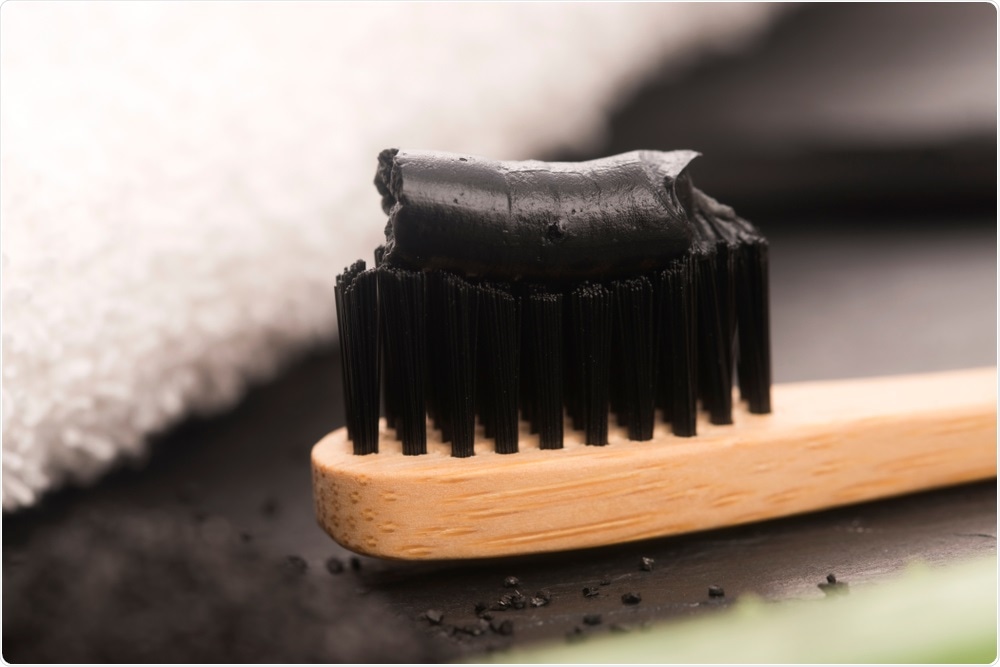
Charcoal-based toothpaste comes with 'real risks'
Writing in the British Dental Journal, scientists have concluded that there are no proven benefits for toothpaste containing activated charcoal and that it may actually increase the risk of tooth decay and staining. The research is in stark contrast to marketing that claims charcoal toothpaste has whitening and antibacterial benefits, among many others.
 joannawnuk | Shutterstock
joannawnuk | ShutterstockActivated charcoal, which is charcoal that has been combined with other agents at high temperatures, is advertised as a method to remove extrinsic dental staining and is a very popular ingredient in many cosmetic and dental products.
Charcoal-based toothpaste has gained popularity in a number of countries in the past few years, from the UK, US, Japan, India, and Thailand, to Lithuania, Australia, Hong Kong, China, Korea, and Switzerland.
The use of charcoal to clean teeth is not a new concept. The ancient Greeks first used charcoal to remove stains from teeth and disguise odors from unhealthy gums.
Now, an extensive review entitled “Charcoal-containing dentifrices” summarises the results of 15 previous studies, providing an overview of what we currently know about charcoal-based dental products.
The researchers concluded that charcoal-based dental products rely too heavily on marketing to back up their claims.
Dr. Joseph Greenwall-Cohen, co-author of the 2019 study carried out by the University of Manchester Dental School warns that marketing claims such as charcoal toothpaste having “anti-bacterial” and “anti-fungal” properties, in addition to being able to whiten teeth, were unfounded.
Marketing campaigns often use vocabulary to evoke a sense of naturalness and purity. In 2017, researchers noted that attractive terms such as ‘eco-friendly’, ‘ecological’, ‘herbal’, ‘natural’, ‘organic’, and ‘pure’ were used to advertise 88 percent of charcoal-based products. 54 percent of the brands studied used two or more of these terms in their marketing campaigns.
The 2017 paper, which was based on 118 articles and 50 charcoal-based toothpastes, was one of the studies included in the new 2019 review.
‘Not all charcoal toothpastes are the same’
The 2017 analysis found that only 8 percent of the 50 toothpastes studied contained fluoride. Over 50 percent of products offered therapeutic benefits and 96 percent claimed to help whiten teeth.
Detoxification properties were described in 46 percent of charcoal toothpastes, antibacterial and antiseptic in 44 percent, and remineralization, strengthening, and fortification were among the properties of 30 percent of these toothpastes. Claims of low abrasiveness were made in 28 percent of the toothpastes, along with antifungal benefits 12 percent.
Only 10 percent of the toothpastes had some form of endorsement by a dental professional, and none of the above claims have been proven.
Along with using attractive language, celebrity endorsements are often used to attract consumers, and Dr. Nigel Carter, CEO of the Oral Health Foundation, warns that many of these endorsements are not showing the genuine effects of the product.
“Many toothpastes which claim to whiten our teeth are simply removing surface stains, and will not offer the long-lasting bright white smiles which many users may be looking for, or being promised through advertising.”
Dr. Linda Greenwall, who was the lead author of the 2019 study and a member of the British Dental Bleaching Society advised:
“It’s imperative that consumers check the ingredients on the packaging of charcoal-based products before usage to ensure they include fluoride, calcium, and phosphate to strengthen and protect tooth enamel.”
‘Real risks’
The new research has found that charcoal-based dental products may actually be harming dental health as a result of not containing key ingredients that help to protect against tooth decay.
Toothpaste should contain 1,350 to 1,500 ppm of fluoride to protect teeth against tooth decay. Many charcoal toothpaste products do not contain fluoride to this level and as such users are at higher risk of developing tooth decay.
Dr. Nigel Carter explained some charcoal toothpastes may be “over-abrasive” and wear away tooth enamel, resulting in sensitive teeth.
In addition to Dr. Carter’s concerns, Dr. Greenwall-Cohen describes the risks of using charcoal toothpaste regularly, especially for those with fillings.
“When used too often in people with fillings, it can get into them and become difficult to get out,” said Dr. Greenwall-Cohen. "Charcoal particles can also get caught up in the gums and irritate them," he added.






















.png)












No hay comentarios:
Publicar un comentario